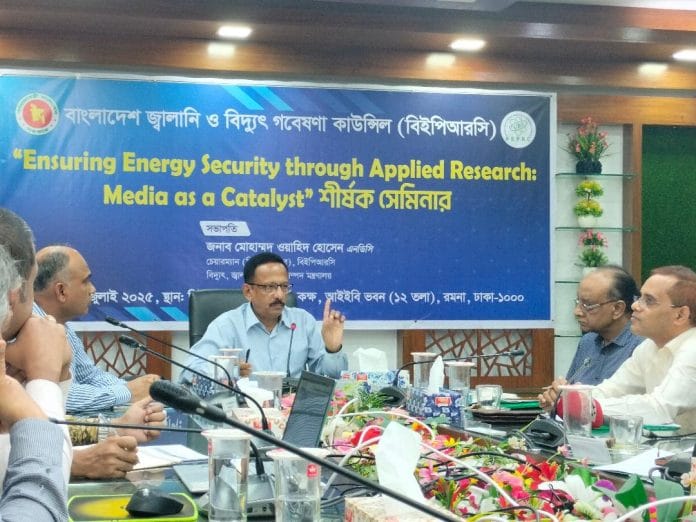The Bangladesh Energy and Power Research Council (BEPRC) sees potential to generate up to Tk 4,000 crore in annual revenue by converting fecal sludge into crude oil.
The projection was revealed at a seminar titled “Ensuring Energy Security Through Applied Research: Media as a Catalyst” held at the BEPRC auditorium in Dhaka on Monday.
BEPRC Chairman Mohammad Wahid Hossain chaired the event, where Dr. Hasan Mahmud, Director (Innovation) of the council, presented the keynote paper. He shared details of a groundbreaking research project titled “Sludge to Oil (SOIL): Production of Crude Oil from Waste-Sludge through Hydrothermal Liquefaction,” initiated at a cost of Tk 2.07 crore. The project is currently being implemented by Khulna University of Engineering and Technology (KUET) and is now in its second phase.
“If the government can commercially scale the research, it could potentially earn Tk 2,000 to Tk 4,000 crore annually by processing just 25% of the country’s sludge—equivalent to 1,000–2,000 barrels per day,” Dr. Hasan said. He added that from Dasherkandi alone, crude oil production from fecal sludge could generate Tk 96 crore in annual revenue.
Chairing the seminar, BEPRC Chairman Mohammad Wahid Hossain criticized the country’s over-reliance on the government for industrial development, with little emphasis on research and development (R&D). “It is unfortunate but true that our industrial sector remains heavily dependent on the government. We must break free from this reality,” he said.
He pointed to China’s rapid progress in R&D as a model, contrasting it with the limited achievements in other sectors in Bangladesh, apart from agriculture. Highlighting the inadequacy of current research funding, he said the University Grants Commission (UGC) typically provides only Tk 5 to 10 lakh per project, which is insufficient for meaningful research. “Such a sum barely covers the cost of a basic study. We must change this culture.”
He announced that BEPRC is now offering research grants of up to Tk 4 crore, with a transparent, merit-based selection process involving both local and international experts. “Researchers and jury members don’t know each other, ensuring impartial evaluation,” he said.
The chairman also emphasized BEPRC’s role in supporting the practical application of innovations. “We financed the development of an electric rickshaw by BUET. We welcome more ideas from researchers and innovators.”
Wahid Hossain expressed concern over the council’s low public visibility. “BEPRC has been around for nine years, yet many—including myself before joining—weren’t aware of it. We have only two permanent staff members—both drivers. All other positions are filled on deputation, leading to knowledge gaps when officials leave. We are now working on building a permanent workforce.”
In his welcome remarks, BEPRC Member (Entrepreneurship) Dr. Md. Rafiqul Islam shared the example of a young innovator from Jamalpur who developed fuel from plastic waste. “We brought him in to see how we could help scale his innovation,” he said.
He added that BEPRC is currently conducting 13 research projects in collaboration with leading local and international universities and institutions. Of these, nine have been completed and four are ongoing. Notable projects include:
- Bio-coal production from waste
- Electricity generation from low-speed wind
- Development of low-cost synchrophasor devices
- Smart meters with priority load management
- Remote substation monitoring systems
Other ongoing research includes energy-harvesting glass, crude oil from waste, the use of big data in power system management, and hydrogen production from water using solar energy. “If successful, energy-harvesting glass could turn building windows into power generators. We’re focused on local, unit-based solutions, and proposals can be submitted year-round—there’s no deadline,” he added.
Speaking at the seminar, Gobinda Chandra Laha, Chief Engineer (P&D) of the Bangladesh Power Development Board (BPDB), noted that Bangladesh imports air filters worth Tk 400–500 crore annually. “Due to their size, transportation costs are high. That money could be invested in setting up local manufacturing. Yet, we continue importing year after year,” he said.
The seminar was attended by representatives from the Bangladesh Energy Regulatory Commission (BERC), the Ministry of Power, SREDA, DPDC, Titas Gas, and other key stakeholders.

